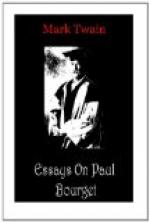As a literary artist, M. Bourget is as fresh and striking as he is as a scientific one. He says, “Above all, I do not believe much in anecdotes.”
Why? “In history they are all false”—a sufficiently broad statement —“in literature all libelous”—also a sufficiently sweeping statement, coming from a critic who notes that we are “a people who are peculiarly extravagant in our language—” and when it is a matter of social life, “almost all biased.” It seems to amount to stultification, almost. He has built two or three breeds of American coquettes out of anecdotes— mainly “biased” ones, I suppose; and, as they occur “in literature,” furnished by his pen, they must be “all libelous.” Or did he mean not in literature or anecdotes about literature or literary people? I am not able to answer that. Perhaps the original would be clearer, but I have only the translation of this installment by me. I think the remark had an intention; also that this intention was booked for the trip; but that either in the hurry of the remark’s departure it got left, or in the confusion of changing cars at the translator’s frontier it got side-tracked.
“But on the other hand I believe in statistics; and those on divorces appear to me to be most conclusive.” And he sets himself the task of explaining—in a couple of columns—the process by which Easy-Divorce conceived, invented, originated, developed, and perfected an empire-embracing condition of sexual purity in the States. In 40 years. No, he doesn’t state the interval. With all his passion for statistics he forgot to ask how long it took to produce this gigantic miracle.
I have followed his pleasant but devious trail through those columns, but I was not able to get hold of his argument and find out what it was. I was not even able to find out where it left off. It seemed to gradually dissolve and flow off into other matters. I followed it with interest, for I was anxious to learn how easy-divorce eradicated adultery in America, but I was disappointed; I have no idea yet how it did it. I only know it didn’t. But that is not valuable; I knew it before.
Well, humor is the great thing, the saving thing, after all. The minute it crops up, all our hardnesses yield, all our irritations and resentments flit away, and a sunny spirit takes their place. And so, when M. Bourget said that bright thing about our grandfathers, I broke all up. I remember exploding its American countermine once, under that grand hero, Napoleon. He was only First Consul then, and I was Consul-General—for the United States, of course; but we were very intimate, notwithstanding the difference in rank, for I waived that. One day something offered the opening, and he said:
“Well, General, I suppose life can never get entirely dull to an American, because whenever he can’t strike up any other way to put in his time he can always get away with a few years trying to find out who his grandfather was!”




